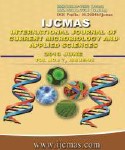


 National Academy of Agricultural Sciences (NAAS)
National Academy of Agricultural Sciences (NAAS)

|
PRINT ISSN : 2319-7692
Online ISSN : 2319-7706 Issues : 12 per year Publisher : Excellent Publishers Email : editorijcmas@gmail.com / submit@ijcmas.com Editor-in-chief: Dr.M.Prakash Index Copernicus ICV 2018: 95.39 NAAS RATING 2020: 5.38 |
Thirty-three indigenous genotypes of sesame (Sesamum indicum L.) were evaluated to assess the extent of genetic diversity based on phenotypic and marker-based genotypic data. Multivariate analysis revealed considerable genetic diversity in the material and led to their grouping into 8 clusters. The yield per plant contributed most to genetic divergence followed by days to 50% flowering and 1000 grain weight, respectively. Altogether, 78 alleles were detected with 27 polymorphic SSR markers, of which 49 were polymorphic (62.82%) with an average of 2.89 alleles per locus. The polymorphism information content (PIC) value varied from 0.99 to 0.01 with a mean of 0.43. Dendrogram analysis grouped the 33 genotypes into three separate clusters exhibiting a genetic similarity coefficient from 0.931 to 0.591 with an average of 0.754. No relationship between geographic origin and genetic diversity was observed. Few genotypes were identified to be important for varietal improvement programme on the basis of their genetic distances and desirable cluster means.The result confirmed the presence of high genetic diversity among the local germplasm.
 |
 |
 |
 |
 |